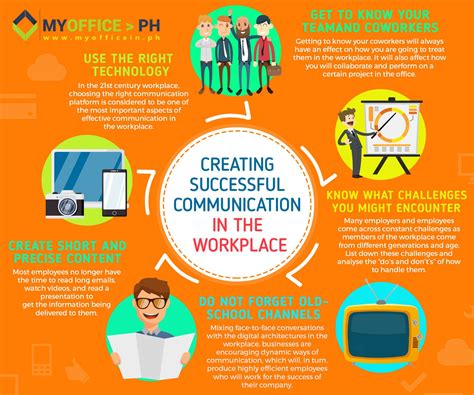Communication Skills For Workplace Success: Key Tips

Effective communication skills are essential for success in the workplace. Whether you’re a manager, team leader, or an entry-level employee, the ability to communicate clearly, concisely, and persuasively is critical. In this post, we’ll explore some key tips for improving your communication skills in the workplace.
1. Active Listening
Active listening is an important aspect of communication. It involves paying attention to what the speaker is saying, asking questions for clarification, and summarizing what you have understood. By actively listening, you can avoid misunderstandings, build trust, and foster a positive working environment.
Tips for Active Listening:
- Give the speaker your full attention
- Don’t interrupt
- Ask questions for clarification
- Summarize what you have understood
- Show empathy
2. Effective Verbal Communication
Effective verbal communication involves using words and tone of voice to convey your message. It’s important to be clear, concise, and confident when speaking to colleagues or clients. Articulating your thoughts and ideas effectively can help you build stronger relationships with your colleagues and clients.
Tips for Effective Verbal Communication:
- Speak clearly and confidently
- Use appropriate tone of voice
- Avoid using jargon or technical terms
- Be concise and to the point
- Avoid interrupting others
3. Written Communication
Written communication is an important aspect of workplace communication. It includes emails, memos, letters, and reports. Effective written communication can help you communicate complex ideas clearly and concisely.
Tips for Effective Written Communication:
- Use simple and clear language
- Organize your content logically
- Avoid using jargon or technical terms
- Proofread for errors
- Use bullet points or numbered lists for clarity
4. Nonverbal Communication
Nonverbal communication refers to body language, facial expressions, and tone of voice. It can convey a lot of information about your feelings and emotions. Being aware of your nonverbal cues can help you communicate more effectively and build stronger relationships with your colleagues and clients.
Tips for Effective Nonverbal Communication:
- Maintain eye contact
- Use appropriate facial expressions
- Use confident body language
- Avoid fidgeting or slouching
5. Emotional Intelligence
Emotional intelligence refers to the ability to recognize and manage your emotions, as well as the emotions of others. It’s an important aspect of workplace communication, as it can help you build stronger relationships with your colleagues and clients.
Tips for Improving Emotional Intelligence:
- Be aware of your emotions
- Practice empathy
- Avoid reacting impulsively
- Be open to feedback
- Develop a positive attitude
6. Conflict Resolution
Conflict is a common occurrence in the workplace. Effective communication skills can help you resolve conflicts more effectively and build stronger relationships with your colleagues and clients.
Tips for Resolving Conflicts:
- Listen actively
- Avoid blaming or criticizing
- Focus on finding a solution
- Be willing to compromise
- Use “I” statements
7. Presentation Skills
Effective presentation skills can help you communicate your ideas more effectively and build stronger relationships with your colleagues and clients. Whether you’re presenting to a small group or a large audience, it’s important to be clear, concise, and engaging.
Tips for Effective Presentations:
- Prepare your content in advance
- Practice your delivery
- Use visual aids to enhance your message
- Engage your audience with questions or stories
- Be confident and enthusiastic
8. Interpersonal Skills
Interpersonal skills refer to the ability to build and maintain relationships with others. It’s an important aspect of workplace communication, as it can help you build stronger relationships with your colleagues and clients.
Tips for Improving Interpersonal Skills:
- Be friendly and approachable
- Show respect for others
- Be a good listener
- Be willing to help others
- Develop a positive attitude
9. Time Management
Time management is an important aspect of workplace communication. It involves prioritizing tasks, setting deadlines, and managing your time effectively. By managing your time effectively, you can reduce stress and improve your productivity.
Tips for Effective Time Management:
- Make a to-do list
- Set priorities
- Delegate tasks
- Avoid multitasking
- Take breaks
10. Feedback
Feedback is an important aspect of workplace communication. It can help you identify areas for improvement, as well as build stronger relationships with your colleagues and clients.
Tips for Giving and Receiving Feedback:
- Be specific
- Be constructive
- Be timely
- Be open to feedback
- Show appreciation for feedback received
Conclusion
Effective communication skills are essential for success in the workplace. By improving your active listening, verbal and written communication, nonverbal communication, emotional intelligence, conflict resolution, presentation skills, interpersonal skills, time management, and feedback skills, you can build stronger relationships with your colleagues and clients, reduce stress, and improve your productivity.
FAQs
1. Why are communication skills important in the workplace?
Effective communication skills are important in the workplace because they can help you build stronger relationships with your colleagues and clients, reduce misunderstandings, and improve your productivity.
2. What are some examples of nonverbal communication?
Nonverbal communication includes body language, facial expressions, and tone of voice.
3. How can I improve my presentation skills?
You can improve your presentation skills by preparing your content in advance, practicing your delivery, using visual aids to enhance your message, engaging your audience with questions or stories, and being confident and enthusiastic.
4. What is emotional intelligence?
Emotional intelligence refers to the ability to recognize and manage your emotions, as well as the emotions of others.
5. How can I improve my interpersonal skills?
You can improve your interpersonal skills by being friendly and approachable, showing respect for others, being a good listener, being willing to help others, and developing a positive attitude.
